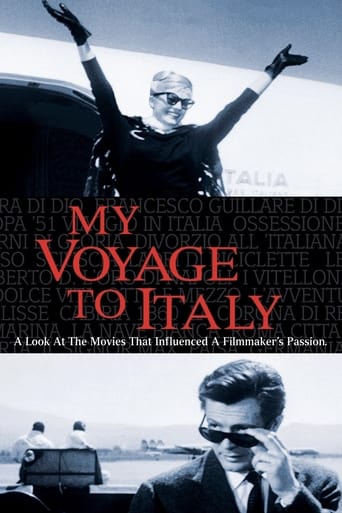MartinHafer
"My Voyage to Italy" is a great film if you are trying to look into the mind of Martin Scorsese or if you are a film student. He talks very candidly about himself and about his adoration of Italian movies and is wonderful for his dedication to film preservation and appreciation. However, if you want to learn about some great Italian films so you can watch them yourself, "y Voyage to Italy" also has a few problems. It isn't a complete overview of great Italian films but a look at Italian films that Scorsese loves and the films ONLY covers a couple decades of cinema. Therefore, it is not exhaustive and many wonderful films from this same period (about 1943 to the mid-1960s) are omitted. And, most importantly, Scorsese not only talks about the films but divulges ALL the endings and twists and meaning--possibly ruining the viewing experience for anyone looking to follow his recommendations for great films to watch. Now all this does not seem like enough that you should completely avoid his film--there are some interesting insights into the films and Scorsese's mind. Just be aware of all this before you decide to watch--it could spoil your chance to experience the films without preconceptions and too much information.As for me, I mildly enjoyed it but was saddened that some of Vittorio De Sica's best films were not even mentioned (probably because he is my personal favorite of these directors). While "The Bicycle Thief" is perhaps his most famous film he directed and I did love Scorsese's discussion of "Umberto D.", the much lesser known and earlier "The Children Are Watching Us" is, in my mind, his very best--and it's an incredibly brave film that predated the ones discussed in "My Voyage to Italy". Now I cannot blame Scorsese for not mentioning it--the film has only recently been re-released by Criterion. An additional film, though, that he should have seen but didn't mention was "Miracle in Milan"--a film that combines wonderful Neo-Realism with the Surrealism that Fellini was known for--but MUCH earlier in the history of Italian cinema. It is brilliantly quirky. Likewise, I would have loved a discussion of Fellini's films between "I Vitelloni" and "La Dulce Vida"--as films like "La Strada" and "Nights of Cabiria" seem oddly absent from Scorsese's discussion.Perhaps I am too picky--especially since I have seen most of the films he discusses. And, perhaps I am too critical because of my adoration of foreign cinema. Plus, I realize I do have very, very strong opinions! All I know is that I did enjoy the film but really would have preferred a most exhaustive and comprehensive overview--but it would have probably lasted 10-12 hours or more! When they bring out some film like this, please let me know!
honeybearrecords
MY VOYAGE TO ITALY (directed by Martin Scorsese) What is it that's so relaxing about Martin Scorsese's voice? I don't know. I've talked to a few different people and we all find his voice to be so comforting. Plus he's smart. I loved his contribution to BFI's 100 Years of Cinema (released in the states as "A Personal Journey") and I really love the documentary "Martin Scorsese Directs" from the American Masters series. I've watched them both over and over.So now I can add another documentary to that list with "My Voyage To Italy". Studying the most important age in film worldwide, Neo Realism, he examines the main players and their major films in a way that is engaging without condescension or over-statistical, boredom. The guy really loves movies and he knows what's important.His film history is just one of many alternative histories to the one championed by film critics static in their culture and prejudices. In writing about Rossellini, De Sica, Fellini and my hero Antonioni he writes about what he loves and what he sees as important. He even picks films that were seen as disasters financially and critically pointing out how their importance was more profound than such predictable criteria. For example, Rossellini's "Voyage To Italy" was a critical and financial failure but what championed by the Cahiers Du Cinema writers like Godard and Truffaut.Scorcese's narration is smart and so loving that from anyone else you would think it pitiful. But in this situation, it's inspiring and just great storytelling.
eye3
In A Personal Journey with Martin Scorsese Through American Movies, (1995) (TV), the eponymous legendary director took us on a proverbial tour of his old neighborhood: the Hollywood movies of the 30s, 40s and 50s which were his school on screen.He now takes us on a second tour of his early influences, this time of early post-war Italian cinema which he recalls growing up watching on an Italian t.v. station in New York, albeit dubbed into English.Want to know those influences? Buy it and watch it.Like with the earlier documentary, this one is an immediate collection standard for everyone from the movie buff to Scorsese's heirs-in-the-making. You may be tempted to watch it through as I tried to one Friday night on a cable broadcast. You'd be better off watching it in segments al la the film school classroom. I know I will.
AnonII
A vanity piece, of sorts, that could be retitled "Everything You Ever Wanted to Know About Italian Film History But Were Afraid to Ask...Martin Scorsese." Wonderfully informative, touching and insightful for the first 2 to 3 hours or so, but exhaustive and exhausting after that. Viva Italia, Basta Scorsese!


